by Rene E. Rojas
September 15, 2013
The 1973 coup that toppled Salvador Allende’s Popular Unity (UP) government, unleashing a wave of repression that wiped out a generation of revolutionaries and working class activists, is receiving long-due attention in Chile’s official circles. Forty years after this watershed episode, right-wing president Sebastian Piñera felt compelled to commemorate the coup, acknowledging unjustifiable human rights violations and the complicity of many who remained silent in the face of raids, torture, and disappearances.
Discussion of the coup will persist during the upcoming election campaign as both candidates, former center-left president Michelle Bachelet and rightist Evelyn Matthei, are bound by personal stories linking them directly to the coup. As children they became friends on military bases headed by their fathers, top military commanders whose relationship and its impact on their daughters’ lives serve as a metaphor for Chile’s historic drama: Bachelet’s father, an Allende loyalist, was imprisoned after the coup and killed under torture in a death camp overseen by Matthei’s father, his former friend and colleague.
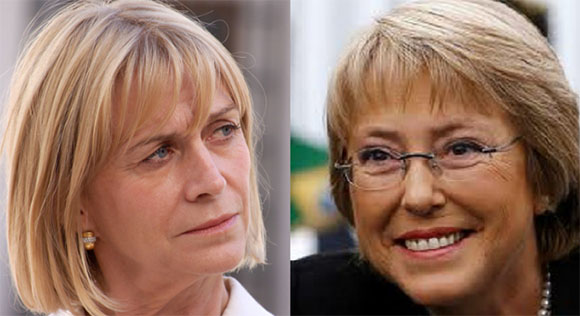
Contemporary candidates Evelyn Matthei (left) and and Michelle Bachelet (right).
Motivated by the symbolic 40 year mark, the backgrounds of the presidential candidates, and re-emerging mass movements, debate of the Popular Unity experience and the coup is certainly welcome. Fortunately, much of the dictatorship’s account will be dismissed, allowing the discussion to focus on the strategic merit of competing revolutionary approaches that came to a head in 1973. An appraisal of the successes and failures of the Chilean road to socialism will be invaluable for the new layers of popular activists cutting their teeth in the student, indigenous, environmental and shanty movements.
On one hand, the center-left political class that from 1990 to 2010 faithfully managed the neoliberal order imposed by the military regime will promote the view that the coup was provoked by radicalized groups and rank-and-file movements who pushed too fast and too far beyond the limits permitted by current circumstances. Contra this view, many revolutionaries will maintain that the coup was successful precisely because UP officials, Socialist Allende, most prominently among them, failed to prepare the masses for the inevitable showdown. Unfortunately, a third, more sober perspective that holds that by 1973 reactionary elite unity had closed the window on revolution will not make it into the debate among radicals.
The new official account reflects the position of Allende, the Communist party, and the right-wing of the Socialists during the UP years.* Though today’s Concertación alliance forsakes all roads to socialism, a key distinction between the UP moderates and their present descendants, it claims to uphold key principles behind the tactics of Allende and his ‘gradualist’ supporters.
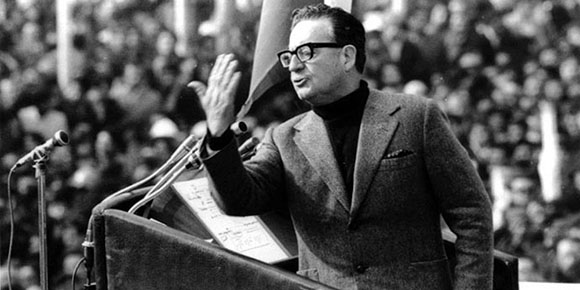
Salvador Allende.
While a Marxist revolutionary, Allende was also committed to the institutions of Chilean liberal democracy and to political pluralism. The strategy pursued by the right-wing of his coalition, therefore, was to achieve radical reforms within the bounds of the republic’s rules of the game. Accordingly, the UP program called for a true nationalization of copper, on which the economy is dependent, the nationalization of the banks, and the completion of the land reform process begun by Allende’s Christian Democratic predecessor, Eduardo Frei. The UP program also called for the continued organization of popular sectors, yet preferred to channel their mobilization via elections and mass demonstrations aimed at pressuring for proposed reforms.
In justifying this reformist perspective, UP strategists, particularly the Communists, appealed to an ostensibly dominant culture of republicanism, and, more precisely, to an interpretation of class formation whereby Chilean workers were not insurrectionary and eschewed a ruptural path to change. In this view, Allende was the historic leader of the Chilean road to socialism and would guide the process successfully through the labyrinth of bourgeois democracy. The UP was similarly deemed as the alliance that would hold the rising popular classes to democratic process.
When polarization deepened beginning in 1972, and employers went on the offensive, Allende and the Communists called for a cooling off of popular actions and for negotiations with the center, particularly the Christian Democrats. The aim was to broaden the ruling coalition into a new majority that could soundly win elections in 1976, fend off threats from the right, and consolidate gains achieved.
In this official account, therefore, the ‘ultra-left’ Socialists as well as forces to the UP’s left, the MIR in particular, were responsible for the coup and thwarting the Chilean road to socialism. They agitated and pushed the rank-and-file to into growing expropriatory direct action that impeded conciliation with the CDs and thus generated the climate facilitating pro-coup oppositional coherence.
The diagnosis and prescription offered by the UP moderates and taken up by the official account of the events leading up to the coup are by no means far-fetched. To begin with, the Communist party, though it had lost ground to the left Socialists and the MIR, remained the hegemonic party of the Chilean working class. Throughout the UP experience, the vast majority of rank-and-filers adhered to the CP’s gradualism and looked to Allende, whose campaigns since 1952 had accompanied a long process of working class formation, as the class’s historic guide.
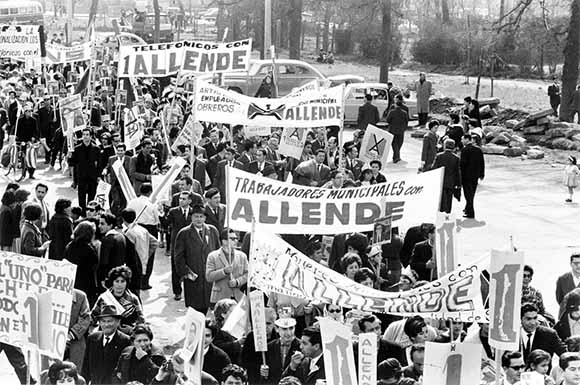
A crowd demonstrates in support of Allende.
Moreover, the March 1973 parliamentary elections, in which the UP took 44% of the vote, seemed to vindicate the idea that priority should be given to constructing a durable majority, even if it entailed momentarily sacrificing the pace of reforms. While the 44% was less than the 51% obtained in 1971, it represented a promising tendency compared to the fragile 36% with which Allende won the 1973 elections. Finally, there was no doubt that the actions of the far left were provocative, that elite sectors were openly calling for a coup, and that popular layers could hardly prepare for a confrontation with the military in time for the showdown that grassroots agitation accelerated. There were undeniable reasons to pursue Allende’s radical reform path to socialism.
The official account, however, is deeply flawed. First, while the UP moderates were correct to uphold democratic principles, there was no reason to limit these to the legitimacy of state institutions. Commitment to political and economic democracy should have driven them beyond restrictive republicanism. By 1972, the dominant class bias of formal state institutions was becoming increasingly evident whereas the new structures establish by the radicalized workers and peasants, particularly the cordones industriales and the consejos campesinos, were precisely serving to enhance participation from below and were developing solutions to the material problems of the poor. Indeed, in clamping down on emerging institutions of popular power, the UP violated revolutionary pluralism.
Second, the dampening the process of social transformations for the sake of building a wider electoral coalition and thus ensuring the survival of the process was a dubious proposition. If in 1970 there had been a large and influential left faction within Christian Democracy—the program of Tomic, the CD candidate supported by this faction is downright radical compared to even leftist platforms of today—by 1972 it had dissolved into the UP while the party’s right wing had regained full control. The key fact is that the March 1973 election results convinced the CD to make common cause with the coup plotters. Moderating the UP’s constituencies for the sake of bringing center forces into the government was a fantasy. Disciplining the ‘ultra-left’ was likewise unrealistic: the MIR and left Socialists often followed the lead of their constituencies, a minority though significant chunk of the working class and poor that was committed to expanding the revolution from below even if doing so detonated armed conflict.
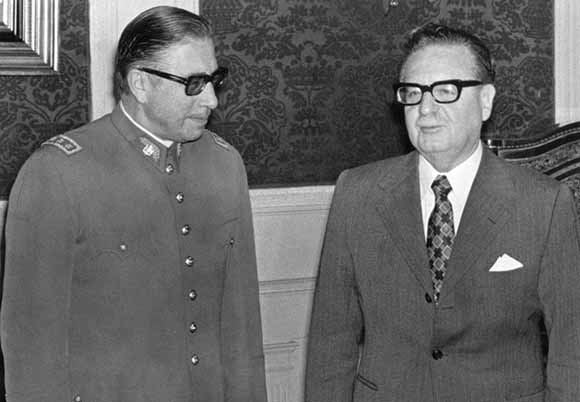
General Pinochet and President Allende pose for a picture just weeks before Pinochet’s coup.
The revolutionary left response to the new official account builds on these flaws. This view, which in turn closely follows the MIR’s analysis of the period, holds the UP responsible for the coup’s devastating outcome. Unsurprisingly, it maintains that the agitation for deepened transformations—more radical land reform (including in many cases full expropriation, that is, appropriating the 80 irrigated hectares equivalent legislation allowed estate owners to preserve), expropriations beyond the economy’s commanding heights and worker control in already nationalized industries, and granting real executive power to the popular power institutions that workers were building—resulted from legitimate demands of growing and increasingly radical sections of the class.
These demands were partially fueled, they argued, by the very moderation of the UP from above. Rather than holding it back, the revolutionary left account maintains, UP leaders had the responsibility to unleash this motor force for change and use it to overwhelm the liberal institutions that contained built-in disadvantages for workers and the poor. Understanding that such radicalization would produce a backlash from elites and their armed forces, the MIR and left socialists emphasized the need to prepare workers, peasants, students, and the poor militarily. The commitment to armed struggle that was central to the MIR’s 1965 foundation and was adopted by the SP three years prior to Allende’s election can best be understood in light of anticipated civil conflict and the required defense of alternatives structures of popular power against the onslaught of elite dominated state force.
As compelling as the revolutionary account is, it too is flawed. It misses a key factor that delineated the prospects for profound revolutionary transformation in early 1970s Chile. A third read of the UP years accepts much of the revolutionary left analysis yet expands it beyond a grasp of the balance of popular and left forces. A complete appraisal of Allende’s presidency, besides evaluating the limits to working within formal state institutions, must include an assessment of the reconfiguration of elite forces during the UP government. Taking to heart a basic Leninist lesson on revolutionary situations, radicals must come to terms with the fact that if ever there had been a window for a deepened revolutionary thrust, by the end of 1972 it had been closed by the reunification of political and economic elites into a sealed reactionary bloc.
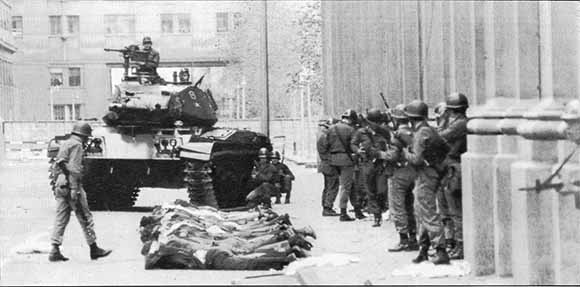
Lenin famously listed three ‘symptoms’ of revolutionary situations, the first of which was ‘a crisis, in one form or another of the ‘upper classes’, a crisis in the policy of the ruling class, leading to a fissure through which the discontent and the indignation of the oppressed classes burst forth’. This condition for successful social revolution is crucial. Unfortunately, between the October 1972 truckers strike and the March 1973 municipal elections, elites reunited into an impenetrable force determined to block any further popular advances and restore unchallenged bourgeois order.
Divisions among Chile’s rulers were stark in 1970 and indeed facilitated Allende’s victory. The modernizing Christian Democrats fielded an indisputably reformist candidate believing that a combination of concessions to increasingly mobilized popular sectors and a well planned industrialization program was the best strategy for Chilean capitalism. The 51% obtained in the 1971 municipal elections, with the CD logging 26% (2% below its vote in 1970) and the far right National Party 17% (only half if its 1970 total), reflected, besides the economic successes of Allende’s first year in office, a deep crisis among Chile’s ruling elites.
In contrast, though the 44% won by the UP in early 1973 was considered encouraging, it masked the fact that the opposition ran a single Democratic Confederation slate that captured 56% of the vote. In late August, the Christian Democrat and the National Party congressmen voted 81 to 47 in favor of a resolution mandating authorities to “put an immediate end” to “breach[es of] the Constitution . . . with the goal of redirecting government activity toward the path of law and ensuring the Constitutional order of our Nation, and the essential underpinnings of democratic co-existence among Chileans.” In short, Chilean elites had put aside their differences in order to put an end to the UP experiment, no matter which road it followed.
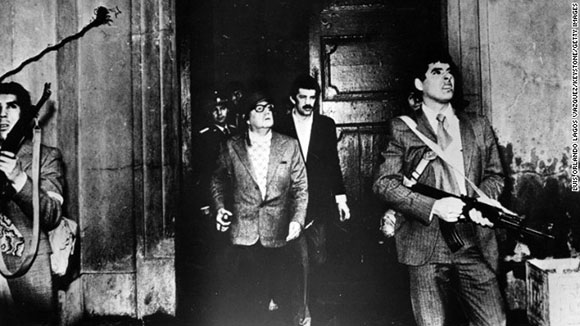
Allende shortly before his death. This is the last known picture of him.
Appreciated in this manner, Allende’s stances deserve reconsideration. His refusal to arm workers and push beyond the state’s institutional framework should be appreciated as more than an expression of his republican commitments. Faced with the prospects of an unwinnable civil war, Allende was compelled to avert a bloodbath by all means. His late 1972 incorporation of top military brass into his cabinet should be viewed as ad hoc efforts, however unfeasible, to buy time and diffuse coup plots that the ruling class was openly planning. Understanding that elites had reunified and were simply waiting for the right moment to act, he also understood what was at stake: decades of building working class organization.
When the coup came, it not only ended Allende’s life and Chilean democracy; it completely eliminated the class capacities that generations of workers and poor people had struggled to develop.
*This summary closely follows the official story described recently by Orlando Sepulveda in ‘How I learned about September 11’. In fact, I am largely indebted to Orlando’s piece which motivated me to commit my reflections on the UP and revolutionary strategy to paper.

Comments
7 responses to “The Chilean Road to Socialism 40 Years On”
Comrade Engels didn’t really answer the question either. His words of wisdom were written long BEFORE all of the instances of the “civil war road to socialism” took place and long before there were any planes or tanks either, “just” machine guns insofar as modern weaponry went. And, as far as I know, they were directed at the putschist substitutionalism of those Blanquist conspiratorial types that still exercised considerable influence within the left of his day, not against any equivalent of traditional Trot types, who advocated militant mass action and organization, including within the armed forces.
Of course, as we both know, Engels advice was mis-used by the reformists of his day to bolster the parliamentary cretinism of the SPD right. Indeed, August Bebel took it one step further to the right in some of his debates with Jean Jaures, where he pretty much offered to sign up for the Kaiser’s war if Germany was attacked by Tsarist Russia. And I believe in his last years, even Engels himself was guilty of similar such utterances. Small wonder that Karl Liebknecht was always getting himself in hot water with the SPD high command for his anti-militarist activities…long before 1914.
While most of the instances of the “civil war road” to socialism” took place during or following WWI, there was no war going on in Spain in 1936 when the generals rose against the pop front regime there. They were stopped by militant workers who, in terms of weapons at their disposal, were out matched and out-gunned by their opponents in the military and the police. What happened later, is, course, another story…one all too similar to Chile.
Insofar as more modern revolutionary situations are concerned, in Iran in 1979, a modern army, equipped with all of the most up-to-date planes and tanks that Uncle Sam could provide the Shah with, was defeated not only by mass mobilizations, but in last minute confrontations with fighters from the Fedayeen and the Mojoheden which helped destroy the bourgeois army there. It took the Ayatollahs quite some time to put it back together, Unfortunately, most of the left didn’t take advantage of it, preferring to tail after them until it was too late.
While neither of these is a mirror image of Chile, they both show that, contrary to some interpretations of Engels, it was possible for out-gunned mass movements to confront and defeat their opponents. And the workers of Chile were no less courageous and willing top fight than those of Spain or Iran were.
Jason, is, of course, right to point out that the Chilean left parties should have been doing organizing within the military long before Allende got into office. I don’t doubt that they probably were doing so. The problem was that they discouraged such activities once the UP was calling the shots just as they tried to hold back the workers in the factories and the peasants in the countryside in order not to derail the “peaceful road to socialism.” I think that we would both agree that this insured that there was a one-sided civil war road to military dictatorship.
Roy seems to think I was defending the strategy of the mainstream of the Unidad Popular. Obviously, I wasn’t. I was merely asking questions that I think usually go unanswered in the traditional Trotskyist response to what happened to Allende et al.
Yes, it’s workers who make up the ranks of enlisted men and NCOs in any army. Those workers aren’t necessarily loyal to socialist parties. Yes, SP members and sympathizers in the armed forces should have organized rank-and-file opposition to the officers. But this should have been done long before the SP, CP etc. formed a government. Starting it afterwards is too late — you need to win over the vast majority of the ranks long before you can start talking about any “road to socialism.”
As early as 1895 Engels noted how conditions in Europe had “become far more unfavourable for civilian fighters and far more favourable for the military.” Conditions for insurrection today are even worse, frustrating the old vision of splitting the armed forces and/or arming workers. The average worker does not know how to use Abrams tanks, armored personnel carriers, or fighter-jets or bombers. The achievement of socialism now requires a truly critical mass; as Engels said, “Where it is a question of a complete transformation of the social organisation, the masses themselves must also be in on it.” Again, the transition to socialism requires the winning over of the majority of rank-and-file soldiers — not merely splitting them — in order to ensure that they will disobey orders given by right-wing putschists against the socialist supra-majority. Hence, yes, socialists must take seriously recruitment and education within the armed forces, and even among the police(!), as our movement re-grows. (We therefore ought to be committed to universal public service and — as Engels was — to universal military service.)
Basic point: given modern weaponry, there is no civil war road to socialism. At best it would mean “the common ruin of the contending classes.”
Allende attempted to compromise and to “buy time” as if it was possible to avoid a confrontation between the elite and the working class. The right wing only used those compromises to organize its coup. Perhaps Rene Rojas is right that by 1973 the rightwing was unified, but I do not believe that constitutes the end of the argument.
In reality the civil war that Allende hoped to avoid actually did occur, but because of his inability to go beyond the narrow framework of elections, the war occurred on terms most unfavorable to the working class. In fact, the working class was DISARMED by Allende when he denounced the sailors (and I believe there were officers among them) in Valparaiso who supported the Allende government.
What if Allende had used the July 29th coup and the military preparations that followed to announce the dismissal of the military officers and rightwing elements? What if he had SUPPORTED the sailors and used that moment to reconstitute the military and distribute arms to organizations of workers and peasants?
There is no evidence that such a strategy would necessarily have won, but the attempt to compromise was certainly unsuccessful and led to the torture and death of thousands of revolutionary-minded Chileans. I remember at the moment of hearing Allende’s denouncing of the sailors in 1973 that a coup was inevitable.
For another viewpoint on the UP experience written by two participants, see Vergara and Sanchez’s article posted at Links International Journal of Socialist Renewal. This article, though wrong on the theory of the bourgeois state, is generally instructive on the questions raised above.
At the risk of being old fashioned, let’s recall what Trotsky said about this question when discussing France under Leon Blum and the Popular Front in France in the 1930s. Answering those who asked “how were such guns going to prove a match for (the) tanks and fighter planes?” of the bourgeois armed forces, Trotsky asked his critics, just who is it that drives the tanks and flies the planes, not to mention makes up the ranks of enlisted men and NCOs in any army? And who is it that services the tanks and planes, i.e., makes them run (or not run) if the pilots, being officers, are not from, or sympathetic to, the working class. To ask the question is to answer it.
Besides, the working class parties had members and sympathizers in the armed forces, who could have organized rank-and-file opposition to the officers. Many wanted to do just that, but were discouraged from doing so by the reformist leadership in order not to alienate “constitutionalist” generals…like Pinochet. Such actions, along side of industrial actions (a general strike), at least would have given the workers a fighting chance, so to speak, rather than being on the guaranteed short end of the stick. As it was, there were many isolated instances of workers organizing themselves to fight back at individual factories, on their own initiative. A coordinated policy of doing so, would have certainly produced better results than the policies that the SP and the CP pursued.
Of course, the whole purpose of the popular front, be it in France, Spain or Chile, was to hold back the masses, not urge them forward. To contain, rather than encourage the class struggle (at least the working class side of it) in pursuit of class collaboration with the “progressive” sections of the ruling class. Such policies have historically only served to demoralize and demobilize the masses of workers and alienate potential allies from the middle classes as comrade Elena’s contribution points out.
The analysis that says Allende was trying to avoid a bloodbath by holding back the revolutionary impetus of the workers has serious flaws and doesn’t confirm to historical reality.
The fact is that the Socialist Party had instructed its leadership to find ways to build popular militias, to find ways of arming the workers. The leadership entrusted to do so, which included many who later became the leaders of the Concentration, failed in their task.
It would seem more logical that the failure of the UP can be laid at the doorstep of the gradualists, especially the Communist Party, who as a result of their efforts to contain the mass movement and reach accommodation with the Chilean oligarchy and imperialism, allowed the bourgeois forces to regroup and form the unified reactionary bloc which emerged. It was the timidity, temporizing and plain cowardice of sections of the UP which led to this defeat.
One has only to contrast the positions of the right wing of the UP with those of the Socialist Party “Commandantes”(the revolutionary wing) to see in very stark terms the different path which could have been taken before the truckers strike to win over the vast majority of the “petit bourgeois”, those who became the political base for Pinochet and the golpistas.
Maybe I’m stupid, but here’s what I don’t understand. As much as I agree that Allende’s conciliationism what doomed from inception, how exactly was he going to arm the entirety of the Chilean working class? Which people, exactly, were going to give the Chilean workers guns? And how were such guns going to prove a match for tanks and fighter planes?
Better for the SP to have never governed at all, methinks, until (1) it could take power entirely on its own, without the CP (much less the “left” bourgeois parties), (2) it had a strong majority of the workers and the rank and file of the armed forces on its side, (3) it had assisted in the creation of a Latin American Socialist International, independent of the official SI (social democrats) and official Communists, which could have lent assistance to a fledgling Chilean workers’ state.